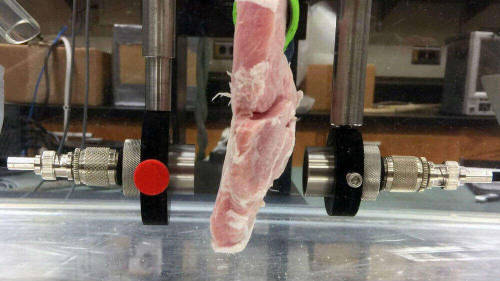Let's go invent tomorrow instead of worrying about what happened yesterday. - Steve Jobs
272 posts
Latest Posts by first-tech-blog - Page 3











Tribute to 90s electronics by Guillaume Kurkdjian
Guillaume Kurkdjian pays tribute to 90s electronics with a terrific series of isometric animated gifs. #Love it!
In 1930, German theoretical physicist Werner Heisenberg came up with a thought experiment, now known as Heisenberg’s microscope, to try to show why it’s impossible to measure an atom’s location with unlimited precision. He imagined trying to measure the position of something like an atom by shooting light at it.
Light travels as a wave, and Heisenberg knew that different wavelengths could give you different degrees of confidence when used to measure where something is in space. Short wavelengths can give a more precise measurement than long ones, so you’d want to use light with a tiny wavelength to measure where an atom is, since atoms are really small. But there’s a problem: light also carries momentum, and short wavelengths carry more momentum than long ones.
That means if you use light with a short wavelength to find the atom, you’ll hit the atom with all of that momentum, and that kicks it around and risks completely changing its location (and other properties) in the process. Use longer wavelengths, and you’ll move the atom less, but you’ll also be more uncertain about your measurement.
Stunning Aurora Borealis from Space in Ultra-High Definition
Scientists record heat moving through materials at speed of sound
Providing unprecedented insight into roles played by individual atomic and nano-scale features, researchers have recorded the first-ever videos showing how heat moves through materials at the nano-scale traveling at the speed of sound.

The groundbreaking videos were made using a state-of-the-art ultrafast electron microscope called FEI Tecnai Femto, which is capable of examining the dynamics of materials at the atomic and molecular scale over time spans measured in femtoseconds (one millionth of a billionth of a second).
Keep reading

ART: “TDS “Athena” - Fractured Space” by Hans Palm
![Flight Deck Of Space Shuttle Endeavour (xpost From /r/space) [1050x699]](https://64.media.tumblr.com/c2674fa6fa9bd765757fe67c1e26023b/tumblr_o5tj5vsOFu1ul634to1_500.jpg)
Flight deck of Space Shuttle Endeavour (xpost from /r/space) [1050x699]
Source: http://apod.nasa.gov/apod/image/1204/EndeavourFlightDeck_cooper_1050.jpg

Went to close the shutters last night and saw this amazing aurora Australis. #aurora @iss @europeanspaceagency via astro_timpeake
Tattoo-like 'e-skin' turns your body into digital screen
In a yet another example to integrate electronic devices with the human body, researchers from the University of Tokyo have developed an ultrathin, protective layer that will help create “electronic skin” displays of blood oxygen level, e-skin heart rate sensors for athletes and other applications.

The team demonstrated its use by creating an air-stable, organic light-emitting diode (OLED) display. Integrating electronic devices with the human body to enhance or restore body function for biomedical applications is the goal of researchers around the world. Wearable electronics, in particular, need to be thin and flexible to minimise impact where they attach to the body. However, most devices developed so far have required millimetre-scale thickness glass or plastic substrates with limited flexibility, while micrometer-scale thin flexible organic devices have not been stable enough to survive in air.
Keep reading

Solar System: Things to Know This Week
Here are a few things you should know about our solar system this week:
1. Beyond Pluto

The principle investigator for the New Horizons mission reports that the spacecraft is healthy and has recently completed the halfway point in its long download of 50-plus gigabits of data about the Pluto system. Now, the New Horizons team has submitted a proposal to continue the exploration. Find out more HERE.
2. A Planet of Particular Importance

April 22 is Earth Day, and we’re deeply involved in studying and understanding how to protect our one and only home world. Join us for a #24Seven celebration of Earth Day. Learn more about our missions to Earth HERE.
3. It’s True — All of It

Sci-fi meets real space exploration when BB8 the droid gets to know Maggie, the engineering model for the Mars Curiosity rover, in a short video produced by some of the people behind Star Wars. Take a look HERE. Photo credit: LucasFilm
4. Bringing Home a Piece of the Sky

Did you know that we’re planning to bring part of an asteroid to Earth? The ambitious OSIRIS-REx mission, which will retrieve a sample from the asteroid Bennu, is slated for launch later this year.
5. Catch Them — If You Can

The best time to view the Lyrids meteor shower will be just before dawn on April 23, when the constellation Lyra is overhead and the moon will be near to setting. Be aware, however, that this year the light of the full moon will make them harder to spot. Find out what else is up in this month’s night skies HERE.
Want to learn more? Read our full list of things to know this week about the solar system HERE.
Make sure to follow us on Tumblr for your regular dose of space: http://nasa.tumblr.com

Caruca – A Single Rider, Electric Golf Scooter/Cart - http://thegadgetflow.com/portfolio/caruca/

Gundam RX-78-2 in Odaiba : お台場のガンダム RX-78-2
A milestone for wearable electronics
Clothes that receive and transmit digital information are closer to reality

Researchers who are working to develop wearable electronics have reached a milestone: They are able to embroider circuits into fabric with 0.1 mm precision – the perfect size to integrate electronic components such as sensors and computer memory devices into clothing.
With this advance, the Ohio State University researchers have taken the next step toward the design of functional textiles – clothes that gather, store, or transmit digital information. With further development, the technology could lead to shirts that act as antennas for your smart phone or tablet, workout clothes that monitor your fitness level, sports equipment that monitors athletes’ performance, a bandage that tells your doctor how well the tissue beneath it is healing – or even a flexible fabric cap that senses activity in the brain.
That last item is one that John Volakis, director of the ElectroScience Laboratory at Ohio State, and research scientist Asimina Kiourti are investigating. The idea is to make brain implants, which are under development to treat conditions from epilepsy to addiction, more comfortable by eliminating the need for external wiring on the patient’s body.
Keep reading

The mind-bending “time slice” concept will make you rethink perception
“Time slice” theory goes like this: Suppose our brains aren’t actually taking in everything we see as we go through life. It’s more like a series of snapshots, taken fast enough that it creates enough of a mental narrative that you don’t stop and wonder, “What the hell just happened?” Between those snapshots, our brains don’t pick up what’s happening. For example, think of the way you watch a movie at the theater.
Follow @the-future-now




Watch: Ultra-HD video time-lapses of the aurora borealis and aurora australis as seen from the International Space Station
Follow @the-future-now

Bone Conduction Headphone – Redefined - http://thegadgetflow.com/portfolio/bone-conduction-headphone-redefined/

Smartphone Survival Test: Huawei Honor 5x via /r/gadgets http://ift.tt/1QihHRQ










16 National Geographic Images Of Cherry Blossom In Japan

New ultrasonic research could one day let devices inside your body stream HD video to doctors

Hatch Baby Smart Changing Pad - http://thegadgetflow.com/portfolio/hatch-baby-smart-changing-pad/










Look at These Beautiful Planets JK They’re Bacteria From Public Buses
If you’re the kind of person who carries hand sanitizer everywhere you go, then you’re aware—maybe too aware—of the colonies of bacteria camped out on everything from gas pumps to ATM machines. Marco Castelli plays to your worst fears in his series A Micro Odyssey.
Oh sure, they look like photographs of distant planets. But they’re petri dishes awash in bacteria found in bank terminals, public buses and women’s bathrooms, photographed against pictures of the stars. Yet suspended in space, they are surprisingly beautiful. “It’s fantastic to let microorganisms meet stars,” Castelli says.
(Continue Reading)

A list of all the gadgets, devices and platforms used by President Obama to carry out his day-to-day presidential duties. via /r/gadgets http://ift.tt/1Qiorz0

Jeeg

This #nebula, captured by @NASA’s Spitzer space telescope is known as “The Spider” and it lives in the constellation Auriga, the charioteer.
Follow the-future-now on Tumblr and Instagram
Monovision improves reaction times & accuracy simulating objects up-close in Virtual Reality
Psychologists study intense awe astronauts feel viewing Earth from space
Picture Earth at the center of a frame. The planet looks unassuming, a fleck, its blue-and-white marbling stark against a black interstellar backdrop. Yet the image likely evokes some reaction.
Now imagine seeing this view from space.

Astronauts who experience Earth from orbit often report feelings of awe and wonder, of being transformed by what they describe as the magic such a perspective brings. This phenomenon is called the “overview effect,” and researchers from the University of Pennsylvania’s Positive Psychology Center are studying it to better understand the emotions astronauts commonly recount.
Penn research fellows David Yaden and Johannes Eichstaedt, and intern Jonathan Iwry, with colleagues from Thomas Jefferson University, the University of Houston and others, have several goals with this work: to look at implications for space flight as the aeronautical community heads toward years-long missions to places like Mars, and to understand how to induce a similar sensation for non-astronauts.
Keep reading

Çin'den Realistik Robot: Jia Jia



Wiik
Music video from Singapore, with track by Yllis and put together by Brandon Tay, employs lo-fi 3D rendering and distortions - recommended in 1080p HD for pixel fidelity:
Our introduction to the image of experimental electronic artist Yllis is an eyeless, robotic mask. Plastered onto art canvases and propped up on pedestals in a computer generated universe, it sings.
wiik traverses a surreal psychic landscape barraged by its own post-internet neuroses. And just like the music, the slick, calculated edges of technology here mingle and dance with he flawed fragility of man.
More Here










Just incredible. Follow @the-future-now
